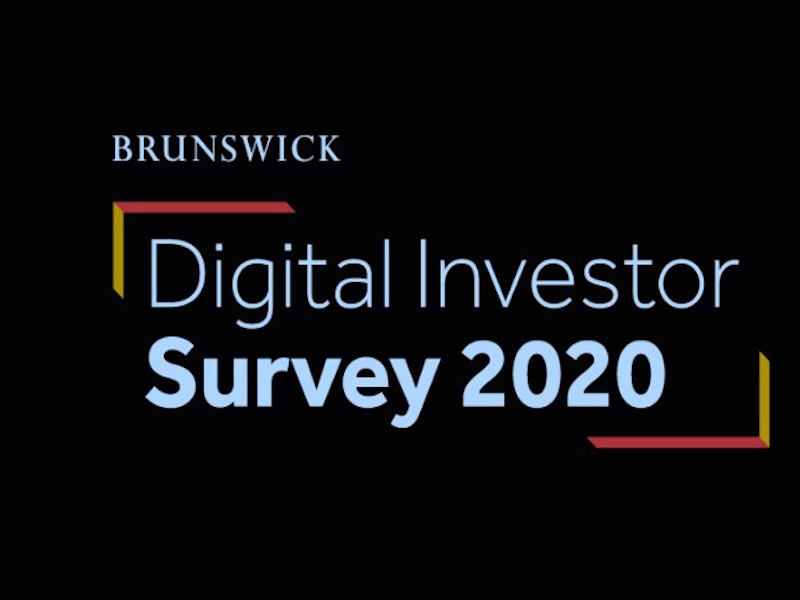Maja Pawinska Sims 25 Feb 2020 // 1:30PM GMT

LONDON —Investors around the world now trust digital sources more than traditional channels for research when they are making investment decisions, according to a new study by Brunswick.
In its third annual Digital Investor Survey, contrary to expectations, the consultancy found that trust in some key digital sources increased in 2019, particularly financial podcasts (up 26%), LinkedIn (16%) and Wikipedia (13%), all of which are now at trust levels equivalent to CNBC.
Brunswick partner Marshall Manson told PRovoke Media: “The growth in trust in digital was a shocker, with LinkedIn outscoring the Telegraph on trust, and blogs outscoring the Guardian. Trust in financial podcasts was the biggest growth in data point in the survey and, for me, the most interesting. I’d put this down to growing familiarity: it’s a new medium, and the more they spend time with it, the more likely they are to trust it.”
Meanwhile, trust in traditional sources, including media outlets, declined or was stagnant. Bloomberg and the Wall Street Journal are still the most trusted sources, but broadcast media are among the least trusted sources, with Fox News, Twitter and Facebook right at the bottom of the table.
Brunswick spoke to buy-side investors and sell-side analysts in the US, Europe and Asia, 25% of whom look after at least $1 billion in assets under management, with 20% in institutions that manage more than $100 billion.
That 98% of them now use digital sources for research and to investigate issues is not surprising, but the increasing trust in digital was one of four findings in the report that might impact on investor communications and engagement.
The second finding of note was that investors are using a wider range of sources than ever to inform decision-making. Seven digital information sources are now used by half or more of investors: search engines, blogs, Wikipedia, podcasts, specialist e-mail newsletters, Twitter and LinkedIn.
Manson told PRovoke Media: “We’re seeing investors accumulating sources in a way that consumers have been, but in a more pronounced way, using traditional less and leveraging newer things. IR folks are used to having one-to-one, personal relationships with key investors; they are still having those conversations, but can do a lot of useful groundwork and preparation for a more open, and dramatically more productive conversation as a result of using digital platforms in the right way.”
Of those surveyed, 88% said they use digital sources to “gain a deeper understanding” and “keep up to date” with industries, issues, and companies they are tracking. And more than two-thirds – 68% – say explicitly that they are using digital sources to get beyond traditional media, to find new information, and to get it faster.
The report finds that digital sources are also increasingly influential: five years ago, only 41% of investors were using digital sources to make investment decisions. Today, 75% are doing so. Search engines and blogs remain the top sources for actionable information, but podcasts and e-mail newsletters are now similarly significant.
When asked to name their most indispensable financially-focused blog, without prompting, 34% of the investors mentioned Seeking Alpha. When it comes to podcasts, investors identified Bloomberg’s family of offerings as their favourites, and also mentioned Capital Allocations, Invest Like the Best, and Planet Money.
For the first time this year, Brunswick asked investors what specific actions they take in response to information from digital and social media platforms. On the buy-side, 31% said that they have decided to buy or sell a specific stock; 54% have discussed information from digital sources with analysts; and 32% have included it in an investment report.
On the sell-side, 30% have included information from digital sources in a framework of stock recommendations, while 48% have written about it in an analyst report or discussed it with a fund manager.
The fourth finding in the survey relevant to comms advisors was that while investors still want the CEO to have an online presence, they also want to hear from a wider range of C-suite voices via digital channels, including the CFO and COO.
Based on the report, Brunswick’s key recommendations for investor engagement programmes include: ensure senior executives have appropriate digital profiles and use them to engage investors, and consider how to include partnerships with podcasts, e-mail newsletters and other emerging platforms.


































.jpg)

















